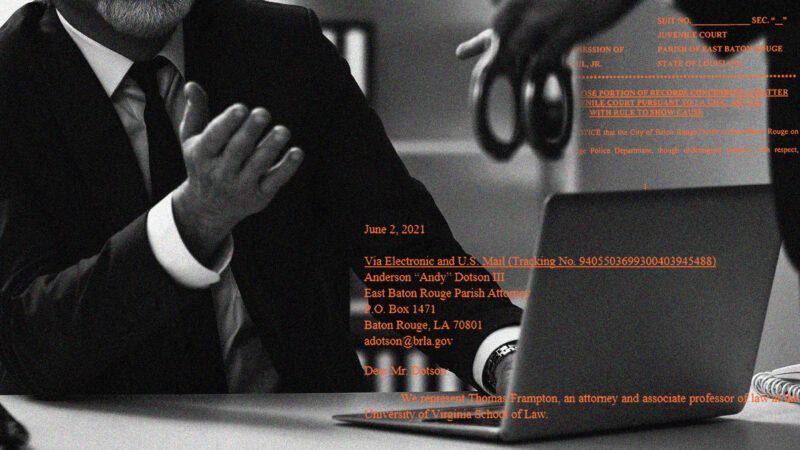This Professor Shared Body Camera Footage of Cops Strip-Searching a Minor. Now, Prosecutors Want To Throw Him in Jail for It.
The move is a direct assault on the First Amendment.

The Parish Attorney's Office for East Baton Rouge is seeking to jail a professor after he shared publicly available body camera footage showing a traffic stop where five Baton Rouge Police Department (BPRD) officers strip-searched a minor and then entered the family's home, with guns drawn, without a warrant or consent.
Thomas Frampton, associate professor of law at the University of Virginia, acquired the video, which was originally obtained and published by Reason. The report attracted significant national attention, ultimately prompting a BRPD press conference on May 28, when the department defended the strip search but said a review was underway as it pertained to the warrantless home entry.
During that presser, Frampton received notice that East Baton Rouge Parish Attorney Anderson "Andy" Dotson III, Assistant Parish Attorney Deelee S. Morris, and Special Assistant Parish Attorney Joseph K. Scott III had filed an order to hold him in contempt of court and put him behind bars for up to six months. The request cites a Louisiana state law that prohibits disseminating "records and reports" relevant to juvenile court proceedings.
Such a proceeding doesn't exist.
In a June 2 letter to Dotson obtained by Reason, Nora Ahmed, legal director for the American Civil Liberties Union of Louisiana, notes that "there is not now (nor has there ever been) a 'matter or proceeding before the juvenile court' related to the events depicted on the videos." The government made the footage public in November of last year.
Dotson did not respond to multiple requests for comment.
The incident depicted occurred on January 1, 2020, when five BRPD cops strip-searched a minor and his brother, Clarence Green, then 23, because the officers allegedly smelled marijuana. After traveling to the Greens' household, they then conducted a warrantless search of the property. Green was indicted for illegally possessing a firearm, which he was prohibited from having while on probation for possession of oxycodone, according to incident reports.
He sat in jail for five months—until the state abruptly dropped the charges. Judge Brian A. Jackson of the U.S. District Court for the Middle District of Louisiana signed off on that request, but in a highly unusual move, he took the opportunity to berate the police for their "serious and wanton disregard for [the Green family's] constitutional rights."
Clarence's brother, who was 16 at the time and whose name has been redacted since he is a juvenile, does not and did not have any proceedings against him.
Perhaps ironically, Dotson's petition to jail Frampton invokes the "substantial amount of negative correspondence from the public" that BRPD has received since the footage's release—as if that were an apt legal justification to jail someone for sharing public information. Frampton, who represented the Greens in a civil suit against BRPD, shared the video at the behest of the family. They recently settled with the city for $35,000.
Ahmed, who is representing the professor, tells Reason that "it's inescapable to think that [this] is not an attempt to ensure [he] does not speak out."
Indeed, there are some serious First Amendment implications, says Eugene Volokh, who is a professor of law at UCLA and an expert on free speech issues.
"Let's say somebody wants to testify that they saw some juvenile committing a crime, or some crime committed against a juvenile…the fact that they're going to testify about it doesn't keep them from telling their story to the media," he tells Reason. "Likewise, if there is some video evidence that's been released to the public and that's been admitted in evidence in some particular other adult court case, it doesn't become somehow secret and prohibited from being published simply because it might be used at some point in a juvenile court hearing."
The Green family's civil suit was formally dismissed after they agreed to the settlement. Accountability, however, is still elusive. That sum will come completely out of taxpayers' pockets, and the officers will evade having to answer for themselves in a civil court proceeding. Perhaps most troubling is that they kept their jobs.
That includes Sergeant Ken Camallo, the officer who initiated the traffic stop and has conducted three warrantless searches since 2017. He testified that his disciplinary record was clean while under oath in a November 2020 motions hearing for the Green case.
When asked by Jackson if that was true, Assistant U.S. Attorney Kashan Pathan answered in the affirmative. Yet just three years prior, the U.S. Attorney's Office for the Middle District of Louisiana, where Pathan works, had to drop a case against a man indicted on illegal weapons charges—because Camallo unlawfully searched his property. BRPD internal affairs documentation indicates that he executed another warrantless search in 2019, and again in 2020 with the Greens. A disciplinary review is ongoing.
"I'm not really surprised in the sense that if Baton Rouge thinks that it's okay to strip-search citizens in public, including children, and run into homes, guns drawn, without a warrant…the fact they'd go after a law professor for releasing the video isn't a huge shock," Frampton tells Reason. "At the same time, it's a little surprising they'd have the chutzpah to claim that they were interested in the juvenile's privacy as the rationale for why I'm facing jail time when the city and police department have made abundantly clear that they have no respect for the privacy and dignity of children, or the population at large."


Show Comments (65)